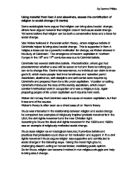Using material from Item A and elsewhere assess the contribution of Marxism to our understanding of the role of education.
Using material from Item A and elsewhere assess the contribution of Marxism to our understanding of the role of education.
Marxist argues that education is only in the interest of the ruling class in the capitalist society, the society is about exploitation of the working class for the needs of capitalism. Education satisfies the ruling class as it provides a labour force which are obedient and easily exploitable.
Althussers argues the bourgeoisie uses ideology to control people. As it wins over people’s minds and avoids having to use force to control society. This happens through two main ways 1) repressive state apparatus - this is where the ruling class maintain control by force and enforcing the order of society e.g. using the police and courts. 2) Ideological state apparatus- this is where they rule by controlling people’s ideas, values and beliefs by manipulating functions of section of society, e.g. the religion and mass media. These two apparatuses reproduce class inequality from generation to generation by failing each successive generation of working class pupils in turn. It also legitimates class inequality by producing ideologies that disguise its true motive.









